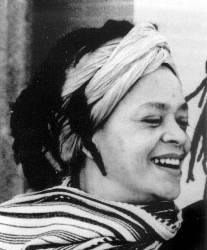Toni Cade Bambara
| Toni Cade Bambara | |
|---|---|
 |
|
| Born | Miltona Mirkin Cade March 25, 1939 New York City |
| Died | December 9, 1995 (aged 56) Philadelphia, Pennsylvania |
| Occupation | writer, documentary-film maker, political activist, educator |
| Notable works | "Blues Ain't No Mockin Bird" |
Toni Cade Bambara, born Miltona Mirkin Cade (March 25, 1939 – December 9, 1995), was an African-American author, documentary film-maker, social activist and college professor.
Toni Cade Bambara was born in Harlem, New York to parents Walter and Helen (Henderson) Cade. She grew up in Harlem, Bedford Stuyvesant (Brooklyn), Queens and New Jersey. In 1970 she changed her name to include the name of a West African ethnic group, Bambara, after learning about them via her great-grandmother.
Bambara graduated from Queens College with a B.A. in Theater Arts/English Literature in 1959, then studied mime at the Ecole de Mime Etienne Decroux in Paris, France. She also became interested in dance before completing her master's degree at City College, New York in 1964, while serving as program director of Colony Settlement House in Brooklyn. She has also worked for New York social services and as a recreation director in the psychiatric ward of Metropolitan hospital. From 1965 to 1969 she was with City College's Search for Education, Elevation, Knowledge-program. She taught English, published material and worked with SEEK's black theatre group. She was made assistant professor of English at Rutgers University's new Livingston College in 1969 and continued until 1974. She was also visiting professor in Afro-American Studies at Emory University and at Atlanta University (1977), where she also taught at the School of Social Work (until 1979). Bambara was writer-in-residence at Neighborhood Arts Center (1975–79), at Stephens College in Columbia, Missouri (1976) and at Atlanta's Spelman College (1978–79). In 1986 she taught film-script writing at Louis Massiah's Scribe Video Center in Philadelphia.
...
Wikipedia
